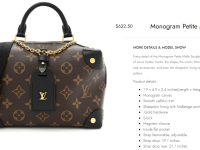Why SaaS Website Builders Like Shopyy, Shopify, and Ueeshop Are Not Suitable for Designer-Inspired Brand Stores
To make a long story short:
It is not feasible to use SaaS-based website platforms to build independent stores for designer-inspired or brand-style product businesses.
1. Understanding the Real “Independent Website” Concept
A true independent website is custom-developed or built using open-source systems. You own your data, control your risk, and can build flexible systems for high-risk industries.
SaaS platforms like Shopify, Wix, Ecwid, BigCommerce — and domestic options like Shopyy and Ueeshop — are not truly independent. These are “pseudo-independent sites” where your business fate is controlled by a third-party platform.
2. Industry Common Sense: SaaS Is Not Meant for Brand-Inspired Business Models
Anyone familiar with the designer-inspired product space knows:
No one seriously building a store in this category will use SaaS-based platforms like Shopify or Shopyy. Here’s why:
• SaaS = Compliance-First
If the platform is legitimate, it won’t allow brand-style or unofficial items.
• SaaS Business Models Are Not Designed for Gray Zones
They profit from clean categories: general goods, service upgrades, and plugin ecosystems — not from high-risk or high-sensitivity goods.
• SaaS Teams Don’t Understand the Industry
They lack awareness of fast-changing tactics (like anti-algorithm cloaking or payment routing), and their customer support is not equipped to solve issues in this field.
3. What Actually Happens to Beginners on SaaS Platforms?
We hear the same story repeatedly in our industry communities:
SaaS companies pitch fake promises to newbies — saying their platform is “okay” with sensitive goods. Many people waste money, time, and energy, only to:
-
Have payment gateways like PayPal freeze funds
-
Get store links blocked by platforms
-
Watch their stores disappear overnight
4. The Technical Dealbreakers for High-Risk Sellers
(1) Traffic Cloaking:
Top players in the industry use TA or FD cloaks, even nested multi-layer cloaks — depending on region (EU/US, SEA, SA).
SaaS platforms advocating IPcloak or similar Chinese cloaking tools? That’s outdated tech from 2016, ineffective post-Facebook updates. Using these on Shopify-like systems leads to instant bans.
(2) Payment Collection:
Some platforms claim you can use PayPal “middle stations.” That trick is long obsolete. Without real anti-detection setups and resource pools (offshore accounts, stable channels, settlement conversion), you’re just waiting for a PayPal freeze.
❌ Stripe, PayPal, Shopify Payments — all fail under scrutiny if your products are even remotely brand-inspired.
5. Three Red Flags to Avoid
🚩 1. Any platform that openly recruits with the promise “we support imitation brands” — is either lying or running a bait-and-switch scam.
🚩 2. If their main business model (clean category sales) isn’t performing well, they start “cutting leeks” — targeting uninformed newcomers in sensitive niches.
🚩 3. Whether it’s Shopyy, Ueeshop, or Shopify — SaaS is not feasible for serious operators in this space.
✅ Conclusion
If you’re serious about launching a sustainable, high-converting site for designer-inspired products, forget SaaS platforms. Build on custom open-source frameworks with teams who know the game — from cloaking to compliance, from payment routing to ad playbooks.
Your site. Your risk. Your control.





